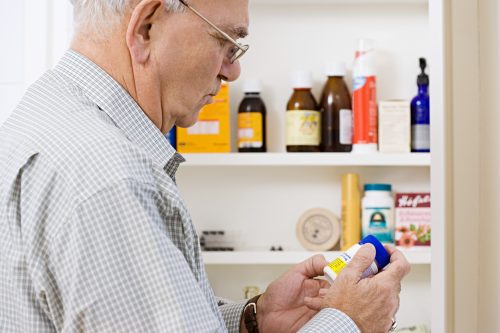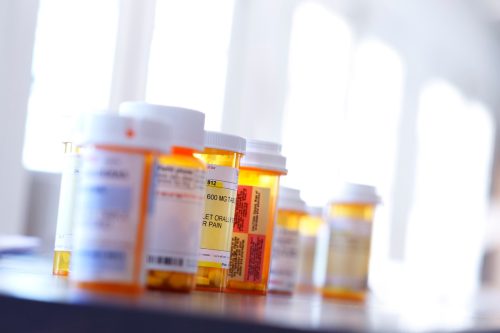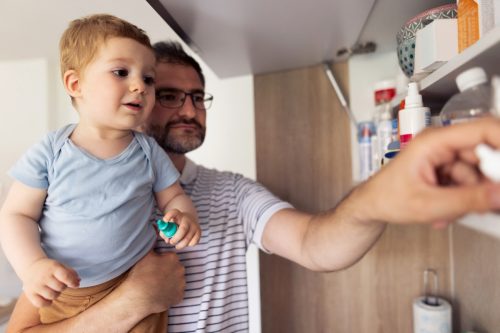50 Percent of People Make This Medicine Mistake
Many of us have a medicine cabinet or drawer filled to the brim with different prescription and over-the-counter (OTC) bottles—you never know what you might need when. But even though these drugs can be necessary, they also carry their fair share of risks. And now, new data has found that many of us are exacerbating those dangers. As it turns out, a significant number of people in the U.S. are making one major mistake with their medication. Read on to find out if you’re guilty of this all-too-common oversight.
READ THIS NEXT: I’m a Pharmacist, and This Is the Medication I Always Warn Patients About.

Medical errors may contribute to more than 400,000 deaths in the U.S. every year, according to a 2013 report in the Journal of Patient Safety. Breaking that down further, one of the most common medical errors is medication mistakes. The Academy of Managed Care Pharmacy (AMCP) reports that errors involving medicines harm at least 1.5 million people in the country every year, with roughly 218,000 fatalities annually.
Common problems people run into when using medications involve drug misuse, taking the incorrect dosage, mixing the wrong drugs, taking medication for longer or shorter than prescribed, and allergy interactions. “Patients are often unaware that errors can happen and often do not take an active role in understanding what is being communicated to them,” the ACMP said.
Now, new research has found that a significant portion of people are making one mistake that could be adding to medication fatalities across the nation.

The C.S. Mott Children’s Hospital National Poll on Children’s Health recently surveyed over 2,000 U.S. adults with at least one child 18 or younger in the household to assess common medication errors. According to the new data, nearly half of all parents keep leftover prescription medicine stored in their home. Out of these, around 40 percent said they had leftover medication prescribed to an adult still stored in their house, while 23 percent were unnecessarily hanging onto a child’s prescription.
“For example, this may occur because parents discontinue giving doses of antibiotics earlier than prescribed, which creates a risk that treatment for an infection will be inadequate,” the experts at the Mott Children’s Hospital state in their report. “It is important that parents understand and follow directions from their child’s doctor and/or pharmacist regarding prescription medicine. Parents might ask if there is likely to be leftover medicine, so they know what to expect.”
For more health advice delivered straight to your inbox, sign up for our daily newsletter.

If you’re among the nearly 50 percent of U.S. parents keeping medicines after they are no longer needed, you are creating an “unnecessary health risk,” according to the Mott Children’s Hospital. Kelly Johnson-Arbor, MD, a medical toxicology physician and medical director at National Capital Poison Center, tells Best Life that this is because “leftover prescription medications are dangerous” to have stored at home.
“These older medications are easy to forget about, but they can be poisonous if taken or used by children, animals, or even adults. Even though these medications are left over, they still may have enough potency to cause poisoning or even death in a child or pet,” Johnson-Arbor explains.
According to the Mott report, a major source of unintentional pediatric poisonings is younger children getting into medicine within the home, while older children are more likely to engage in experimentation or intentional misuse with leftover medications.

It’s not just leftover prescription medication you shouldn’t be storing in your home. According to the Mott Children’s Hospital, all drugs should be discarded after they’ve expired, whether they’re prescription or over-the-counter (OTC). Crystal A. Riley, PharmD, a lecturer of health administration at New York University’s (NYU) Robert F. Wagner Graduate School of Public Service, says that “while there is ongoing debate on the dangers of taking expired medications,” it’s better to be safe than sorry.
“It is generally safest to only take those medications that are still within the window of the ‘use by’ date,” Riley explains. “As medications age, the chemical composition of them can change. The best case scenario is that the medications lose efficacy. On the other end of the spectrum, there’s a possibility that drugs can decompose into potentially toxic compounds. This is especially important to consider in the pediatric population, as they tend to be more sensitive to inappropriate dosages of medication.”
But keeping medicines past when they’re needed or after they’ve expired is not just a risk for parents and pet owners. In fact, Johnson-Arbor says that certain older medications such as as eye drops or ear drops can grow bacteria and other germs over time. This makes them potentially harmful to anyone, including adults, according to the toxicologist.
Best Life offers the most up-to-date information from top experts, new research, and health agencies, but our content is not meant to be a substitute for professional guidance. When it comes to the medication you’re taking or any other health questions you have, always consult your healthcare provider directly.
" Conservative News Daily does not always share or support the views and opinions expressed here; they are just those of the writer."




